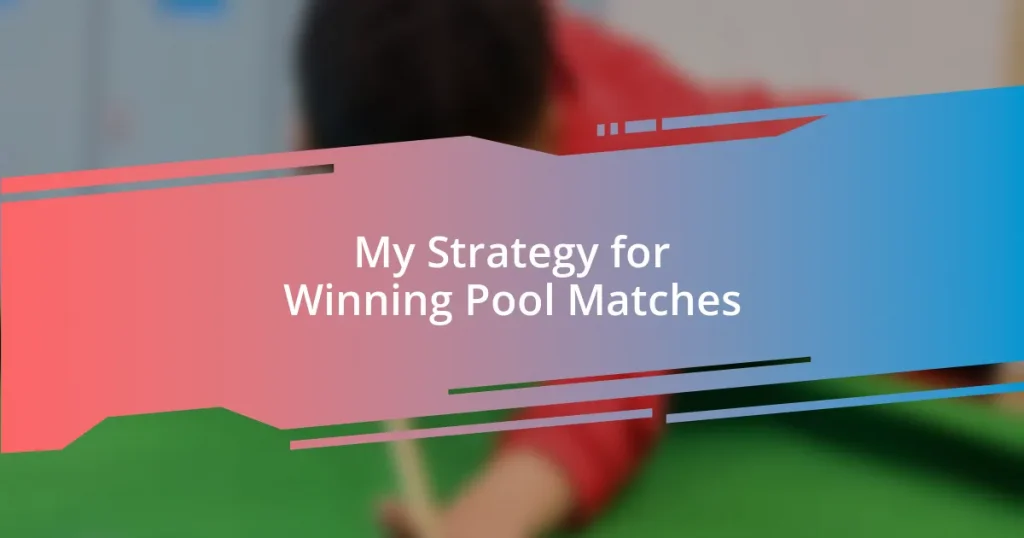Key takeaways:
- Mastering pool involves understanding fundamental skills, positioning, and the importance of mental strategy.
- Practicing with purpose and consistency leads to improved shooting skills and game performance.
- Analyzing opponents’ behaviors and adapting strategies based on their tendencies can provide a competitive edge.
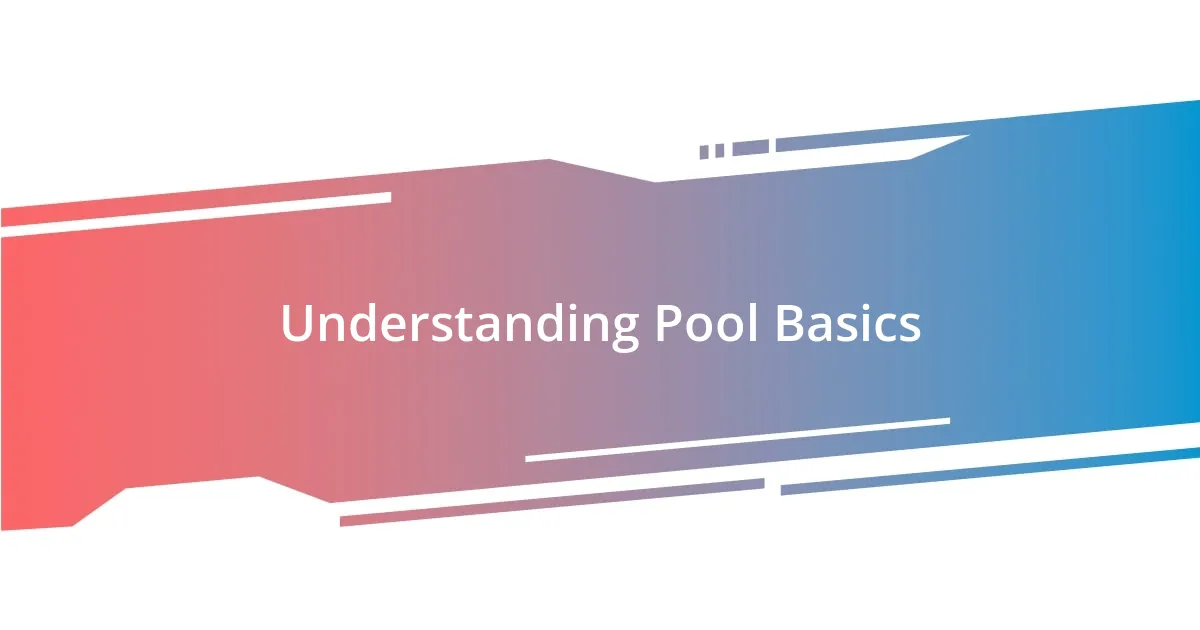
Understanding Pool Basics
When I first started playing pool, I was captivated by how each game seemed to tell a story; the table transformed into a canvas where strategy became essential. Understanding the basic rules, like how to take turns and score points, is crucial for any newcomer, but it’s the rhythm of the game that truly pulls me in. How often do you find yourself pondering the best angle for that perfect shot, with the whole social atmosphere buzzing around you?
There’s definitely a beauty in mastering the fundamentals, from the cue grip to the stance. I remember feeling overwhelmed by all the different types of shots—like the draw, follow, and bank shots. Each technique requires practice and a keen spatial awareness, which, I must admit, took me quite a while to develop. Have you ever paused to appreciate the fine balance between the physical act and mental strategizing?
As I gained more experience, I realized that pool is not just about sinking balls but also about reading your opponent. Analyzing their body language and understanding their next potential moves added a layer of complexity that keeps the game alive. The thrill of predicting their strategy always gives me an adrenaline rush; it’s almost like a mental chess match, don’t you think?
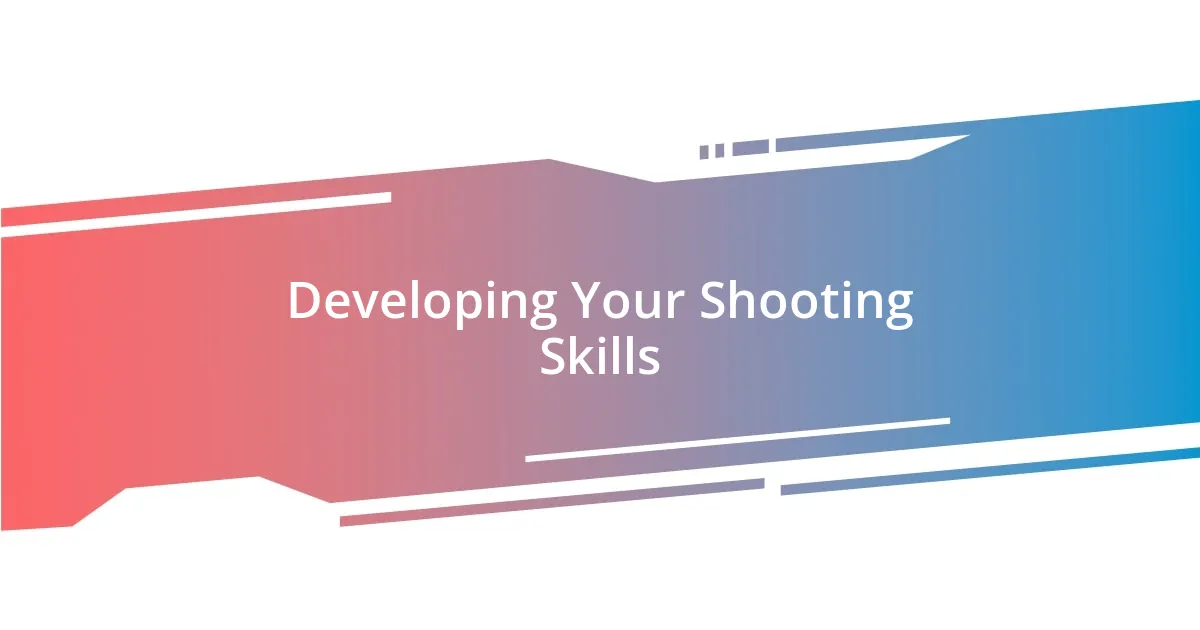
Developing Your Shooting Skills
When it comes to developing your shooting skills, practice is essential. I remember those early days at the pool hall, where I would spend hours perfecting my aim. The feeling of finally sinking a challenging shot after numerous attempts is exhilarating. It’s a reminder that persistence pays off in ways you might not expect.
To enhance your shooting precision, consider these techniques:
- Stance and Alignment: Ensure your body is positioned correctly, with your feet shoulder-width apart and aligned with the target.
- Grip the Cue Firmly: A loose grip can lead to inconsistencies. Find a balance that feels natural but controlled.
- Follow Through: After striking the cue ball, extend your cue smoothly to maintain accuracy.
- Practice Different Shots: Dedicate time to work on bank shots, draw shots, and other techniques. Variety is key to becoming a well-rounded player.
- Visualize Success: Before taking your shot, visualize the path you want the ball to take; it helps create focus and intention.
As I practiced these techniques, I found that my confidence grew. I would even set little challenges for myself, like hitting a certain target before moving on. This not only kept things fun but also reinforced my skills. Embracing the process and celebrating small victories along the way transforms your learning journey into an enjoyable experience.
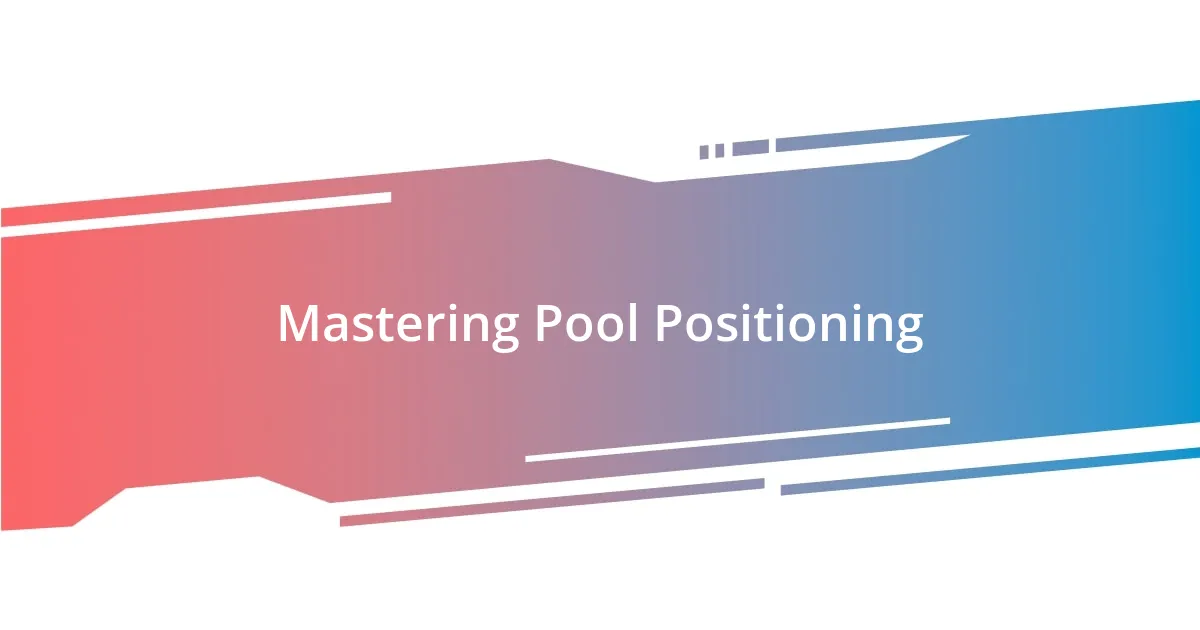
Mastering Pool Positioning
Mastering pool positioning is an art form that ultimately shapes your game strategy. I vividly remember a match where I focused on not just making shots, but also on where the cue ball would land afterward. By anticipating the position needed for my next shot, I dramatically improved my overall play. Have you ever noticed how a well-placed cue ball can change the entire flow of the game?
One key aspect of positioning is understanding the concept of angles. During one of my early competitive matches, I was at a critical juncture. I realized that positioning the cue ball just a few inches to the left would open up several potential follow-up shots, while a careless placement could jeopardize my lead. This revelation transformed my approach. It made me consider not just immediate actions but also future possibilities. I often think, how much more could players achieve if they honed their positioning skills?
Lastly, be aware of your opponent’s positioning, too. I recall a particularly intense tournament when my rival managed to block my shot by exploiting his own positioning masterfully. Watching him, I learned that recognizing when to obstruct your opponent can be just as crucial as focusing on your own game. It’s a delicate balance—you want to be offensive while still maintaining a defensive outlook. With a bit of practice and foresight, mastering this aspect can elevate your game significantly.
| Positioning Aspect | Description |
|---|---|
| Anticipation | Predict where the cue ball needs to be for your upcoming shot. |
| Angles | Understand and use angles to create optimal positioning for follow-up shots. |
| Opponent Awareness | Consider your opponent’s position to block their opportunities effectively. |

Analyzing Opponent Strategies
In pool, closely observing your opponent’s strategies can give you a competitive edge. I recall a match where I noticed my opponent’s hesitation before taking shots. This pause revealed his uncertainty about the angles, and I seized the opportunity to exploit his indecision. By taking mental notes on his patterns, I adjusted my gameplay, anticipating his next moves. Have you ever considered how small tells can be game-changers?
Sometimes, I found that analyzing an opponent’s preferred shots helps in predicting their future actions. I once faced a player who consistently favored corner pockets. Instead of mirroring his style, I shifted my focus to creating obstacles on those paths, effectively taking away his comfort zone. It dawned on me that recognizing these tendencies is crucial—after all, isn’t it easier to respond strategically when you know what they’re likely to try next?
Additionally, paying attention to your opponent’s body language can reveal their mindset. In a high-stakes game, I noticed a fellow competitor fidgeting whenever they faced a tough shot. This nervous energy mirrored my own feelings during challenging moments, reminding me that we all experience pressure. Recognizing this in others gives you an emotional insight that can guide your approach—wouldn’t you want to capitalize on that? By being mindful of both their moves and emotions, I found that I could create a psychological advantage to elevate my own strategy.
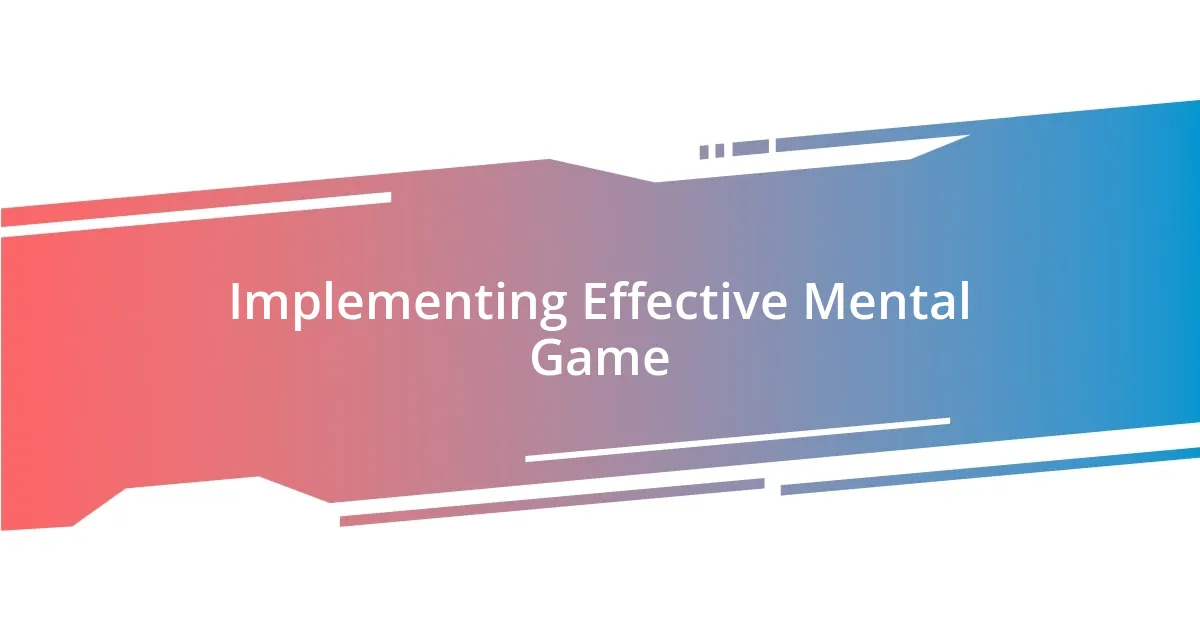
Implementing Effective Mental Game
When it comes to pool, the mental game can often be the deciding factor in a match. I distinctly remember a situation where I paid too much attention to my own shots and allowed my mind to cloud with self-doubt. The moment I shifted my focus to visualizing each shot as already made, my confidence soared. Have you ever tried mentally rehearsing each stroke? It’s incredible how this visual practice can translate to actual performance.
Another strategy I’ve found effective is staying calm under pressure. In one tense tournament, I faced a series of challenging shots that could have easily rattled me. Instead of succumbing to anxiety, I took a deep breath, counted to three, and reminded myself of past victories. This simple technique helped me regain my focus. I often wonder, how often do players overlook the power of just breathing?
Additionally, maintaining a positive self-dialogue has transformed my approach to matches. There was a time when I would berate myself after a missed shot, feeling the weight of disappointment. It wasn’t until a mentor pointed out the importance of self-encouragement that I began to see improvements. After each shot, I now affirm where I did well, allowing myself to learn from mistakes without dwelling on them. Isn’t it fascinating how our inner voice can shape our performance?
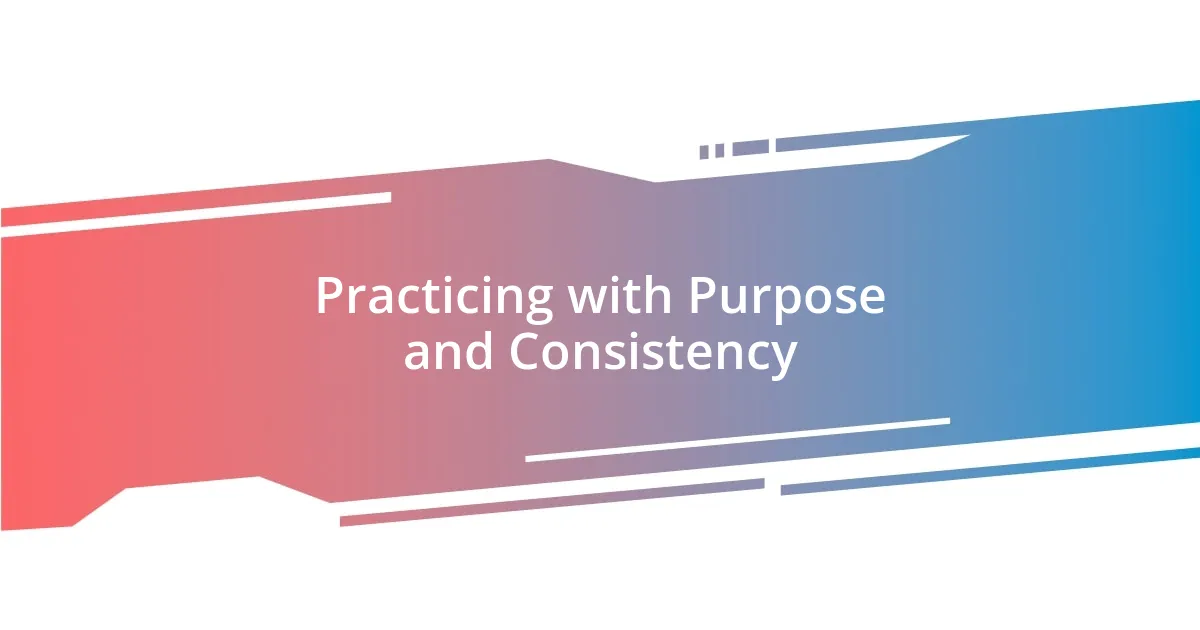
Practicing with Purpose and Consistency
Practicing with purpose isn’t just about putting in the hours; it’s about making each session meaningful. I remember a day when I dedicated time to focus purely on my break. Instead of mindlessly hitting the cue ball, I aimed to increase my accuracy and power. I used a target drill where I aimed for specific balls on each break. This concentrated effort not only improved my break but also built my confidence for competitive matches. Have you ever noticed how focusing on one skill can profoundly impact your overall game?
Consistency is equally essential. I’ve learned that I need to practice regularly, not just when I feel like it. Setting a schedule helped me stick to it; I practiced three times a week, rain or shine. Initially, it was challenging, but over time, I found that this routine created muscle memory and sharpened my instincts. Think about it—how much more effective is repetition if it becomes a part of your lifestyle?
Additionally, I find it valuable to practice with specific goals each time. Whether it’s mastering a particular shot or improving my cue ball control, having a target transforms my practice into a purposeful endeavor. I vividly recall a period where I struggled with bank shots. I dedicated a few sessions solely to this, experimenting with different angles and speeds. Those focused practices yielded impressive results in my matches. Have you set clear goals during your practice, and if not, what might that change for you?

Refining Your Match Techniques
Refining your techniques during matches is crucial for optimal performance. I recall a moment in a championship where I shifted my stance just slightly, refining my body alignment. That small adjustment brought my aim into perfect harmony with my shot, transforming my results instantly. How often do players overlook the power of their physical setup in favor of just focusing on the shot itself?
In my experience, developing a consistent pre-shot routine has been a game-changer. Before every shot, I take a moment to visualize where I want the cue ball to go. This simple practice grounds me and helps eliminate any distractions. Think about your own pre-shot rituals—do they enhance your focus, or are they scattered and unfocused?
Finally, I’ve learned the value of adapting my strategy based on opponents’ tendencies. There was a match where I noticed my opponent tended to break strongly but struggled with longer shots. By playing more defensively and forcing them into challenging positions, I was able to tip the game in my favor. Isn’t it intriguing how understanding the dynamics of your opponent can completely change the flow of your match?










